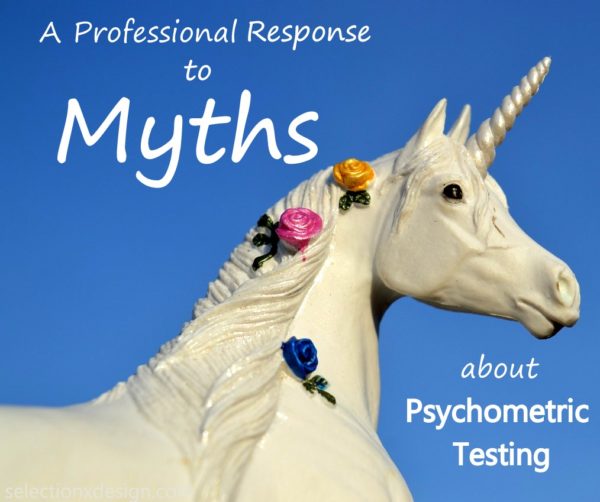Psychometric testing is a proven best practice in recruitment and selection. But as a psychometric testing consultant and trainer, I know first-hand–there are some odd perceptions out there about employment tests and their value. Today I’d like to share a few of the most common misconceptions and myths I encounter and how I respond to them.
- Psychometric testing doesn’t work.
Depending on the context and individual raising this point, I may ask them to be more specific: What about it doesn’t work? Tests can successfully measure abilities and attributes. Test scores are effectively used as part of decision making in recruitment, selection, placement and development. Psychometric testing does ‘work’ in this respect.
(I might be left wondering: What would you propose works better?)
- Test results can be easily faked.
This misconception seems to be widely propagated online, and I’m not sure why. My response is to suggest considering: Can an ability or aptitude be faked? Could anyone pretend to have a higher level of say analytic ability than they actually do? This might happen through cheating or very lucky guessing, but otherwise would be difficult to achieve.
What about personality tests? Many of the well-established and lengthy personality measures include built in scales to detect lying and efforts to portray oneself in a certain way. If a person is attempting to provide a particular impression of themselves rather than answering honestly, it will be detected. In recruitment decisions, the candidate may be dropped from further consideration.
- No one really uses test scores in making employment decisions; they’re just a formality.
Conducting psychometric assessment is expensive and time consuming for organisations. I wonder, would any company bother doing this if scores weren’t going to be used?
That said: Anyone who is using tests for decision making must have the training and experience that’s needed to know how to use test scores appropriately.
- The best employees may be those who failed the test.
Psychometric tests which are used in employee selection measure job-specific attributes. Test scores predict the extent to which an applicant will display those same qualities once they are employed. As long as there is a good association (correlation) between test scores and job performance, those doing well on the test will also successfully complete related work.
It is important to keep in mind that psychometric tests are limited to measuring just a specific aptitude or set of attributes. Other additional qualities will likely contribute to on-the-job success. These might include past experience, ability to handle specific scenarios, work attitudes, etc. Always, tests should be just one part of an overall selection process.
- No special qualifications are needed to buy tests.
For me, circulation of this myth is particularly hard to believe. Training and qualifications such as BPS Test User are needed to access tests that are commercially available and have a record of good psychometric performance. Tests that are free or generally accessible are unlikely to have demonstrated qualities like fairness, reliability and validity. Such measures are questionable from a legal perspective if used in hiring decisions. If anyone out there is using tests they have found for free to select employees, please be aware that you are taking a huge risk.
Have you come across other myths or misconceptions related to psychometric testing? I’d love to hear about them in the comments below.


